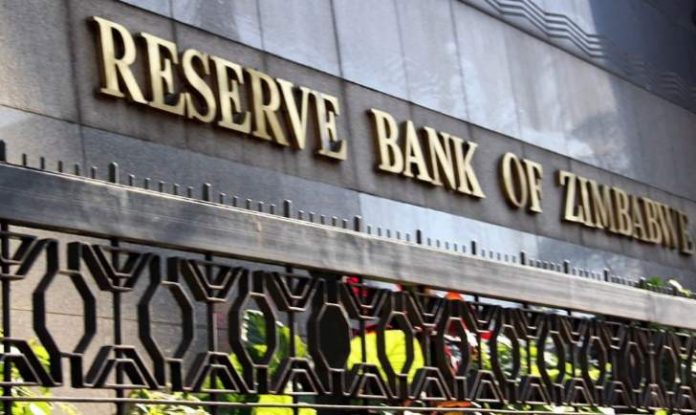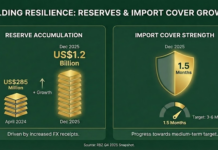Highlights
- Total money supply in the economy as at December 2019 stood at $34.5 billion. Of that $22 billion (64%) is in local currency and $12.5 billion or US$785 million in in foreign currency.
- Cash in circulation at $1.1 billion as at December 31, 2019 which is 3.2% of total banking deposits.
- Outstanding Savings Bonds as at December 31, 2019 at $1.9 billion down from $2.2 billion in 2018. Statutory Reserve Balances amounted to ZW$918 million up 129% from $401.5 million.
- Medium-term Bank Accommodation window reviewed to $1.5 billion to cater for winter farming on yields on the open market for TBs currently at between 15-18%. A total $800 million disbursed as at December 31, 2019.
- Collateral Registry to be implemented by June 2020.
- Policy Rate maintained at 35%
- Free funds make up 30% of total export receipts
- Current account surplus of US$311.2 million in 2019 from a deficit of US$1.39 billion in 2018 after decline in imports.
- Foreign Direct Investment declines to US$259 million from US$717.1 million in 2018. Net portfolio investment inflows declined to US$3.7 million from US$54.7 milion due to high country risk. لعبة الكوبه
- Private sector long and short term loan inflows increased to US$49.3 million from US$48.3 million in 2018.
- Total foreign currency was down 4.4% to US$6.88 billion from US$7.21 billion. Exports US$3.89 billion, Diaspora remittances US$635.43 million, NGOs remittances at 521.16 million.
HARARE – The Reserve Bank of Zimbabwe says it is on course to stabilising the exchange rate, which in turn will anchor the country’s disinflation programme, through which monthly inflation is forecast to close the quarter below 5% and annual inflation at 50%.
At the same time, the bank acknowledged that de-dollarisation, which was embarked on last year, was not an event but a gradual process, which should be complete withing a timeframe of five years, in line with other countries experiences on de-dollarisation. enzo casino
Presenting the Monetary Policy Statement this morning, governor John Mangudya said at the top of the measures to pursue economic stability was the need to implement the monetary targeting framework and enhancing transparency on the interbank market through the adoption of the Reuters foreign exchange market tracker system.
Mangudya said the key focus area for the bank was to manage the stock of money in the economy to ensure that it does not cause inflation and bring volatility to the exchange rate. He noted that 50% of the $34.5 billion money supply that was in the economy was centred on only 200 entities with the highest entity holding $1.5 billion and the lowest entity having $2 million.
“In order to efficiently manage liquidity, the RBZ will have amicable conversations with these 200 entities in order to make them take up Corporate Bonds, mostly to avoid shocks on the rate. At rates favourable to them” He also added that the monetary targeting framework would be operationalised through the use of existing open market operations tolls that include Treasury Bills, Savings Bonds, Statutory Reserve Requirements which would deal with the uneven distribution of deposits in the economy.
After launching the Reuters deal tracker system on a trial basis, Mangudya said banks would now become market makers in the user-test environment to ensure that the platform can handle tasks in a live environment. The RBZ will set aside appropriate forex to intervene and stabilise the market once the system is live. A further refinement of bureaux de change regulations is expected.
Mangudya believes that there is an improvement in macro-economic signals, which heightened the prospects of positive economic growth while low inflation were supporting a gradual de-dollarisation process within a timeframe of five years. He noted that use of the local currency had improved to $459.6 billion from 189 million transaction while foreign currency deposits had gone down by 37% as at December 31, 2019 while forex denominated loans stood at 22% of total bank loans in the same period.
On legacy debts, Mangudya said Exchange Control had processed and validated US$1.2 billion from 730 applications out of 1 080 requests. Of those processed, 299 transactions worth US$861 million had been rejected for lack of supporting evidence and double-dipping. The balance of 350 transactions worth US$457 million were being processed for finalisation by February 29, 2020. “The validated blocked funds exclude the legacy obligations of US$361 million under the RBZ Debt Assumption Act.
“We cannot not pay these amounts as services has already been provided for. IATA is owed about $60 million because Zimbabweans not RBZ were travelling abroad. Of that legacy amount we also still owe grain suppliers from 2016… So how do we expect them to supply the country with grain this year when we haven’t paid. Mangudya however added that payment will be spread over a period of time. “We are currently finalising a payment pathway.”
Return to basics?
The Monetary Policy Statement comes after the Monetary Policy Committee met on February 14, 2020 for the fifth time since its inception. The fact that the MPC is meeting regularly to direct monetary policy has to be commended. عدد الدومينو In a country where many structures are not functioning well, it’s important that these baby steps to normalcy are celebrated. The fear has been that the MPC will not meet regularly or if it meets it will not be able to make changes to monetary policy. The committee actually addressed significant issues that will impact the economy going forward. So far the committee has tried to follow basic economic theory. Sometimes basics don’t address pressing challenges but in the long run basics will put the economy on a sustainable growth trajectory.
There has been a downward trend on inflation, however we caution it’s way too early to start celebrating. There is tremendous pressure on wages to go up which will add a fresh round of inflation plus the impromptu runs on the exchange rate, which Mangudya believes will be sorted out if he presents attractive financial instruments to the 200 entities control half the money supply. He highlighted the issue of Corporate Bonds, which are by nature unattractive as they do not have PA status. In any case, the balances mostly represent working capital for the companies. It’s important for the bank to anticipate and control other factors which are likely to add inflationary pressure if its forecast of year on year inflation of below 50% by year end is to be achieved.
The MPC celebrated the exchange rate stability that has prevailed since October. Although there is a premium of almost 40% between the black market and the interbank rate there has been stability on both rates for the last three months. Money supply was the major cause of the exchange rate instability and Mangudya reiterated the resolve of the central bank to curtail money supply. If the bank sticks to its resolve it might just be able to tame the twin monsters of exchange rate instability and inflation.
The MPC gave an update on the foreign exchange trading platform that is being introduced into the market. Significant volumes have been traded on the interbank market which can only increase confidence into the system. It’s important for RBZ to fast track the implementation of the trading platform to enhance transparency and remove some of the arbitrage opportunities which reduce efficiency of the market. The move to further liberalise the operations of bureaux de change is welcome.
Foreign currency inflows decreased last year and perhaps the RBZ should also look at the role foreign currency retentions have played in reducing foreign exchange inflows. Gold producers have reduced output due to the retention levels, while the tobacco season is likely to be poor partly due to the drought but also partly due to protests by small scale farmers on how they were treated last season.











